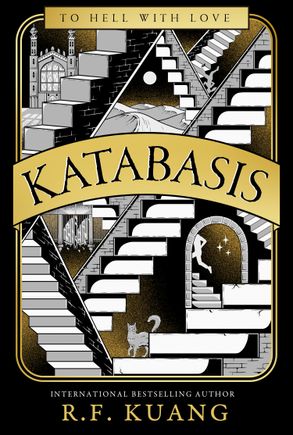R F Kuang, best-selling author of Yellowface, Babel, and the Poppy War series, takes readers to hell in a brilliant new book about memory, identity, truth and contradiction. Katabasis is bitingly funny dark academia, bursting at its binding with philosophical Easter eggs, social commentary, cultural analysis, and the perfect amount of absurdity.
Katabasis: funny dark academia
Set (at least initially) within Cambridge University’s Department of Analytic Magick, Katabasis is articulated with magic of the linguistic variety. No subject is safe from the author’s wit as she draws parallels between philosophy/magic, university/hell, and hierarchies/relationships.
Alice Law has been researching Hell since the unfortunate demise of the notoriously difficult (but highly accomplished) Professor Grimes. In this universe, Hell is a physical place that scholars can report upon… if they survive long enough to return. Dante’s account is cleverly described as being ‘distracted with spiteful potshots’ while Orpheus’s notes are ‘in shreds, like the rest of him.’
Alice is determined to go to Hell, fighting against time (and the deterioration of rotting body parts) to find her professor’s soul and put it back where it belongs. Her daring plan is informed by extensive research, classic texts, and undiluted determination. Alice’s plan does not include the presence of her academic rival, Peter Murdoch.
Peter – described as a lanky, dishevelled genius – exudes the easy optimism of someone who has never known hardship. Like Alice, Peter intends to retrieve Professor Grimes from the courts of Hell. Insufferably helpful, he insists the two join forces. Reluctantly, Alice agrees to embark upon a shared journey, armed with chalk and the requisite pentagrams. Together, they risk their imagined futures for the sake of blinkered pasts, resulting in an exceedingly tense present.
Getting to hell is the easy part. Finding Professor Grimes is a mission unto itself. Alice and Peter are both intelligent (or delusional) enough to be capable of great things, but neither can be entirely sure whether they are lost souls wandering Hell, or intrepid explorers forging a new path. They realise quickly why no modern Hell scholarship exists – those who venture into Hell are unlikely to survive.
The classically-documented dangers of Hell pose great risk as it is, but the deeper Alice and Peter delve, the more unknowable danger they realise they are in (and it’s not the kind they are likely to recover from).
 Katabasis by R F Kuang.
Katabasis by R F Kuang.
It is difficult to extricate a soul from Hell without knowing where to find it. Alice and Peter must reflect on Grimes’ moral failings in order to determine which court of hell is most likely to hold him. This uncomfortable, but necessary, exercise compels the students to unravel flawed premises and draw new conclusions, culminating in an emotionally complex application of the sunk cost fallacy. This (and more) forces a re-shaping of their increasingly flimsy convictions, some of which form the deteriorating basis of their previously solid self-concepts.
Applying academic rigour to the trials of hell, Alice and Peter traverse hyperbolic space and tolerate one another as best as two competing scholars are capable. Peter’s effortless competence irritates high-achieving Alice to no end, and there are unspoken tensions lurking beneath the surface of their mostly-pragmatic relationship.
Reframed by logical examination, a change of context and a re-aligned purpose, Alice and Peter reach new levels of emotional intimacy, until Alice makes a discovery she can’t un-discover (no spoilers).The transformative dynamic between these well-developed characters is just one of many intense pleasures inherent to this unique reading journey.
Read: La Bohème review: now relocated to 1930s Berlin at the Sydney Opera House
Katabasis: hell is a desolate wasteland, a writer’s market, a bazaar
In the Katabasis universe, Hell is a desolate wasteland, a writer’s market, a bazaar. It is its own institutional structure, complete with transcripts, libraries and texts. Peppered with paradoxes, Hell is an infinite, boundless space populated by faceless shades, creepy bone-things, and dangers unknowable. From identifying the meaning of the good (harder than it sounds) to a unique application of the prisoner’s dilemma, the tartaran setting provides unique opportunities to explore questions like; what is desire? What’s the difference between violence and cruelty, or complicity and loyalty? Is it possible to reconcile two opposing beliefs to find the truth at the base of a paradox?
Weaving an action-packed plot with philosophically-driven character growth, Katabasis explores the subtle mechanisms of inequality, the unsteady scaffolding of external validation and the psychological imperative to valorise tyrants. An examination of the role of memory in relation to identity (a la Derek Parfit) is brilliantly executed with multi-layered genius through setting, plot and character – turning abstract thought experiments into vivid phenomenological experiences.
Katabasis: humour-infused adventure
Littered with ontological nods ranging from the obvious to the obscure, academic rigour is built into the fictive foundations of this story, resulting in a vast intellectual playground for the reader’s imagination. Never didactic, this humour-infused adventure makes light work of heavy themes through suspenseful pacing, addictive characters, heart-stopping revelations, and a high-concept premise.
Read this book if:
- You enjoyed Harry Potter as a child and have often wished for an edgy, intelligent, adult equivalent.
- You appreciate humour of the understated, witty, absurdist, and satirical varieties.
- You’ve suffered at least one existential crisis.
- You never want to look at chalk the same way again.
It is rare to encounter a story that can be described as both ‘light imaginative escapism’ and ‘dense philosophical exploration’, but Kuang’s linguistic magic strikes a paradoxical balance between these contradictions and more. This book will resonate with academics, overthinkers, and those whose belief defies just enough reality to reveal both sides of a mobius strip.
Katabasis by R.F. Kuang is published by HarperCollins.
Discover more screen, games & arts news and reviews on ScreenHub and ArtsHub. Sign up for our free ArtsHub and ScreenHub newsletters.
